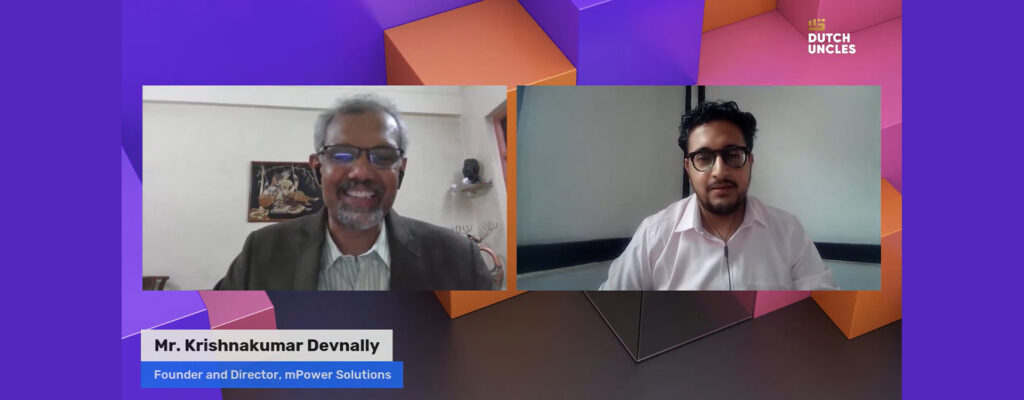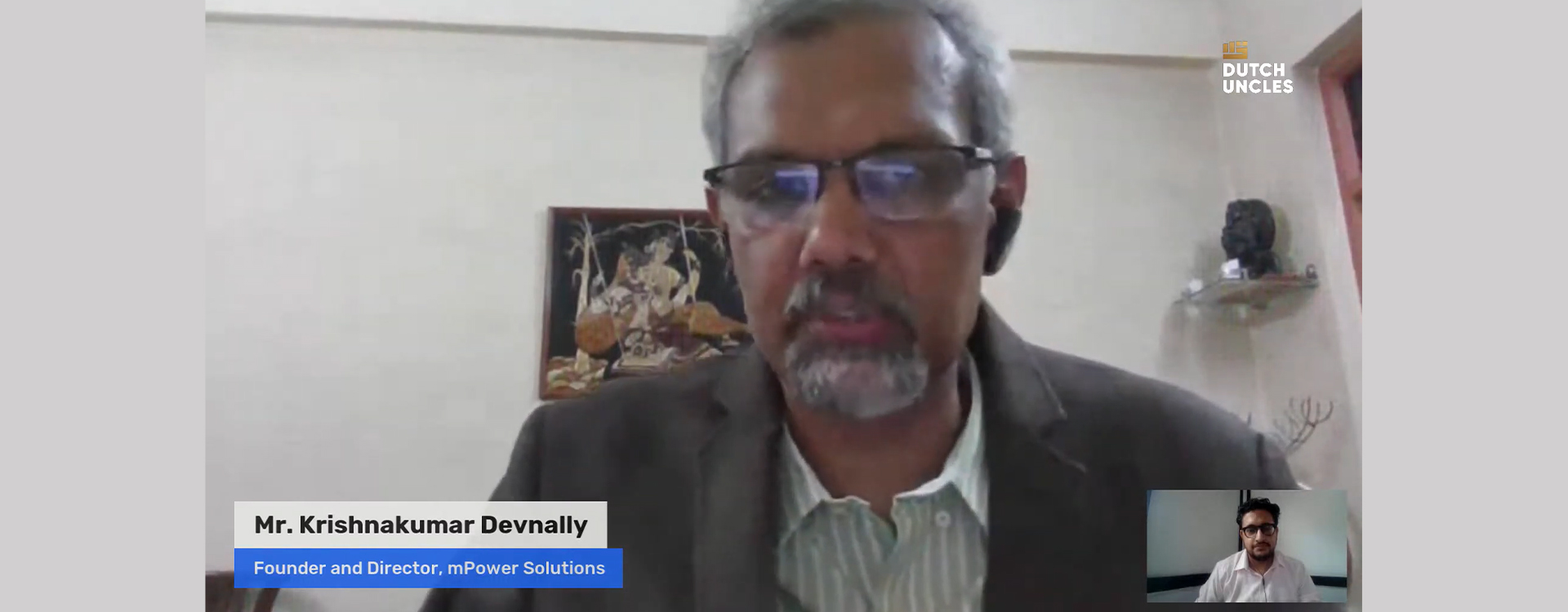Having the right attitude in addition to an innovative mindset is a yardstick for any successful entrepreneur. In order to maintain the sustainability of a startup venture, it becomes important to streamline the direction in which it is functioning and whether the product or service is catering to the needs of the market. Likewise, pivoting or changing the direction of business sometimes emerges as a better choice in order to maintain the sustainability, thereby improving revenue and surviving in the market. But it is better said than done – how you pivot can make all the difference, especially in the VUCA (volatility, uncertainty, complexity, and ambiguity) world.
In order to address the topic of pivoting and providing some surviving strategies, Dutch Uncles had an Innerview session with Mr. Krishnakumar Devnally. ‘Innerview – Only the Paranoid Survive’ a weekly live 45-minute motivational and inspirational talk show which features interviews of industry experts who bring forth informative and life experiences and techniques to help shape and gear you up, to succeed.
‘‘
If something is not measurable, one cannot manage that particular thing. When you have a benchmark set for yourself, a performance related target, and certain goals, then you go on the path of realising those particular goals and getting to the next level.
- Mr. Krishnakumar Devnally
Mr. Krishnakumar Devnally is a seasoned technology professional having thirty years of experience in the industry, seventeen years with leading telecom and IT Brands and the rest thirteen years as an entrepreneur. Considered as a bridge between startups and investors, he is a mentor, advisor and investor to several startups and also a consultant to MSMEs. Mr. Devnally has been mentoring early stage startups to build scalable and sustainable business models and helping them in fundraising. He is a member of an advisory board of investment bankers and investors helping them do the due diligence on their global target startups. Mr. Devnally’s mission is to create a global economy empowered by innovation and entrepreneurship thus empowering people and helping them realise their dreams.
In brief the session had the following takeaways:
- Innovation is the foundation of entrepreneurship
- Design thinking/lateral thinking
- Team is above idea
- How to build scalable and sustainable businesses
- How to survive the VUCA world – Pandemic and Pivoting
Here are some excerpts from the interview
What should be startups’ perspective on time to time assessments?
Like the saying goes that if something is not measurable, one cannot manage that particular thing. When you have a benchmark set for yourself, a performance related target, and certain goals, then you go on the path of realising those particular goals and getting to the next level. So the most important part in this entire cycle becomes a timely periodical assessment of the situation.
Let me give an example of a Fintech startup led by a woman entrepreneur. They have a PVP policy which stands for whether to pursue versus pivot. The point of having this was to analyze their business model on a quarterly basis and examine if it is time to pivot or not. Many times the environment in which a business is running changes drastically, affecting the startup founders badly. It is very important for startup entrepreneurs to overcome these challenges and adversities and come out much stronger.
Therefore, timely assessment is very much important in order to do the necessary course correction as you go ahead. One should apply tactics, examining situations around you and then quickly adapting. One can also get advice from their mentors, advisors, and make the necessary moves in the direction that you become successful and you take your startup to the next level.
There is a difference between an obstacle and an impossibility. Towards that, when is the most appropriate time to Pivot?
Pivoting is not an independent activity, it includes assessment of your performance and revisiting your business model periodically. What you are doing by revising and assessing your business model is that you are revisiting the aspects like technology, marketing modules, vendors, team management, logistics and finance help that you are getting. In short, it will give you a heads up regarding your business status and you can improve accordingly.
Pivoting is like an experiment, whenever you change your business model, in a way, you are pivoting slowly. Pivoting is like a holistic thing, like a trial and error method that entrepreneurs use and change their status quo into something new based on what is happening around them.
Now when we talk about obstacles and adversities, healthtech, which indirectly benefited from the pandemic, is the most pivoted sector. Startups in the health tech sector have come up with innovations like disposable ventilators which nobody thought of before COVID.
Please suggest ways on how startups can be sustainable and scalable, thus thriving through any adversity?
Sustainability is the function of three elements:
Innovation
The first fundamental aspect is the innovation, trying to create some kind of unique deliverable and patent-able, which has IP (Intellectual Property) attached to it. Once you build that uniqueness into your business model, at least in technology, for next one year you have that first movers advantage. After this you have to rethink about new challenges that are faced by your customers and build products to address those particular challenges.
Increase Customer Base
The second aspect is the focus on increasing the customer base. The agility, the speed of operation matters when it comes to getting more and more market shares which is a sure shot formula to be a sustainable startup.
Solve a Long Term Critical Problem
The third and the most important aspect about being sustainable is whether you are trying to solve a long term critical problem faced by your customer. If you are talking about problems which are faced by, hypothetically, say 1000 people around so you can probably do the business with those 1000 people. But your product should be such that it should be addressing a common problem or a pain point that is faced by your customers.
Create Value
Ultimately the fourth important point is the value that you create by giving your unique product, capturing market share, and solving long term problems. That is what I think about sustainability, it is a step-by-step process and will only come once all these aspects are taken care of.
‘‘
Pivoting is like a holistic thing, like a trial and error method that entrepreneurs use and change their status quo into something new based on what is happening around them.
- Mr. Krishnakumar Devnally
Audience Asks
Before pivoting, there are a dedicated set of customers. Can you suggest some measures to retain those customers?
The idea of pivoting is not to completely change your focus from the particular set that you are trying to address. Wherever you are talking about doing business with a certain target market, you are assessing not only the problems but also the strengths of your internal team. So when it comes to matching your strengths with how you can address the problem, your normal customer base remains the same. While pivoting, you should ensure that you are trying to pivot in an area which is pertaining to your areas of strength as well as pertaining to probably the problems of the same customer that you are trying to address.
How to have investors’ confidence in your pivoting strategy since it has its own risk especially in this VUCA world?
Looking at it from a different perspective, when I look at investors, I look at the investor being a strategic partner rather than just putting his money into my startup. Whenever I approach any investor for my startup, I ensure that I am talking to a person who will not just bring in the money to the table but he will also bring in his expertise, his connections, and his wisdom along with the money. So if you ensure that your investor is a strategic investor, he will always help you pivot. So I think we should go to an investor, take his inputs and then pivot.
Yes, over a period of time you can probably acquire new territories, new customer base just to expand your business but I think pivoting doesn’t mean giving away your own customers. Moreover, the best way to retain customers is to have effective communication with them and maintain honesty in your deliverables.

Are you willing to take that risk?
As Mr. Devnally says, “Entrepreneurship is about two aspects, one is the urge of creating something new and the second is the willingness to take risks. Many times we engineers are good at creating something but where an engineer fails is taking that risk. So unless you are able to take risks, you don’t become an entrepreneur completely. That is why many of the people fail in spite of having great ideas.”
So take that risk, and be honest with your customers, your stakeholders and investors. Watch the full video to understand the correct way to pivot in this VUCA world.




